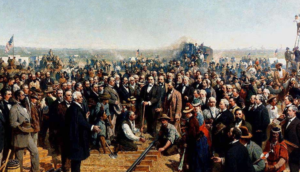Big Tech is riding the same rails as robber barons of the past

The tech industry – in particular, the FAANG stocks – have hit a strange inflection point. They’re taking a beating on Wall Street. And Facebook is under attack from all sides.
There was The New York Times piece (Delay, Deny and Deflect: How Facebook’s Leaders Fought Through Crisis), which was written with the assistance of no less than 50 sources.
An international committee of foreign governments has requested that Zuckerberg appear before lawmakers to face inquiries, particularly into disinformation, election meddling and privacy issues. Zuckerberg refused.
Now it seems that Internal documents Facebook (had) fought to keep private (have been) obtained by UK Parliament. “The secret cache is believed to include emails between Mark Zuckerberg and other executives that shows the firm knew about flaws in its privacy policy and allowed them to be actively exploited,” according to Daily Mail.
How to Get Away with Murder
How many times have we said that the only way to cover up a crime – or indiscretion – is to commit an even bigger crime.
There are no checks on his powers or decisions, by the Facebook financial shareholders, governments or users, and Zuckerberg’s apologies tours and posts, and the company’s fallback under accusations – delay, deny, deflect – are no longer cutting it. If anything, Zuckerberg has further consolidated his power, eliminating the Oculus founders – Palmer Luckey a while back (Why did Facebook fire a top executive? Hint: It had something to do with Trump) – and Brendan Iribe a month after the exits of Instagram co-founders Kevin Systrom and Mike Krieger, and Whatsapp founder Jan Koum earlier this year. “Tensions between Zuckerberg and his acquired start-up co-founders have reportedly been growing over the past year as the company deals with scandal after scandal. Instagram’s Systrom (recently) said “no one ever leaves a job because everything’s awesome,” according to CNBC.
Zuckerberg has been getting away with it for so long, – asking forgiveness rather than permission – why stop now?
Why Now?
If we a conspiracy theorist, we would note that, being both Chairman and CEO and holding 60% of the stock, Zuckerberg’s stranglehold over Facebook is absolute – or has been to date. The other major player in terms of shear size and reach is Google, which has always failed at social, the latest being its shuttering of Google+ following a security breach. Odd that this Zuckerberg pile on should come so soon on its heels and note to self: Google and Facebook have long been bitter rivals (although the article mistakenly lists Eric Schmidt as the third Google co-founder). Odd also that it follows so closely on the heels of the midterm elections, and we know that, previously, Google did skew search results in favor of the preferred candidates of the founders.
While we are certainly far from a defender of Facebook, when a company is attacked from so many different quarters simultaneously, one does wonder what else in going on from which we are being deflected?
None of the tech cartel is above reproach. There’s Google’s secretive Chinese censored search engine (and this just in: Google Reveals Plans to Monitor Our Moods, Our Movements, and Our Children’s Behavior at Home) and the Draconian working conditions at Amazon’s warehouses (Amazon accused of treating UK warehouse staff like robots Ambulances called out 600 times in three years but online retailer denies GMB’s claims of unsafe working conditions). As for job creation, nine of every 10 Silicon Valley jobs pays less than in 1997, while tech company founders are now counted as being among the world’s wealthiest people, having attained their fortunes in historically short amounts of time.
According to Ars Technica, Study: Over 20 years, Silicon Valley workers’ median wage has fallen by 14%. That difference is being pocketed by investors and owners, the research concluded.
No surprise then that Big Tech pushes back against ‘dramatic increase’ in visa denials.
Tech and the Age of the Railroad Barons
The Atlantic points out an interesting parallel between the rise of the railroads in the US and that of the tech sector: “There was a time when Americans loved and talked about the transcontinental railroads the way we loved and talked about the internet. The steel lines spanning the nation were, as the Stanford historian Richard White put it, “the epitome of modernity.” “[Americans] were in love with railroads because railroads defined the age. The claims made for railroads by men who wrote about them were always extravagant,” White wrote in Railroaded: The Transcontinentals and the Making of Modern America. “The kind of hyperbole recently lavished on the Internet was once the mark of railroad talk.”
Then the public turned on the transcontinental railroads. “The innovations entrepreneurs brought to the railroads—financial mechanisms, pricing innovations, and political techniques—were as harmful to the public, to the republic, and even to the corporation as they were profitable to many of the innovators.”
Just as the public – and governments – wakened to the fact that the railroads, which heralded a gilded age, were “corrupt monopolies,” so it is with this latest gilded age. The adulation and near reverence heaped on these latter-day robber barons is quickly diminishing. The pendulum has swung, due to their own hubris and misdeeds: Amazon deals; and the free and (once) unfettered use of Facebook, Twitter and Google have come at a steep price, we’ve learned. Zuckerberg may be one of the major perpetrators, but claims of abuse of power and position could be leveled at all of the major Big Tech players. While much focus is put on whether or not Zuckerberg should relinquish some of his power or should/will Sheryl Sandberg take the fall, the issue is far greater than this. You think Google filed patents to monitor our moods and movements simply to sell us yet another pair of socks?
Truth be told, once again and from all quarters, we’re being railroaded. Onward and forward.